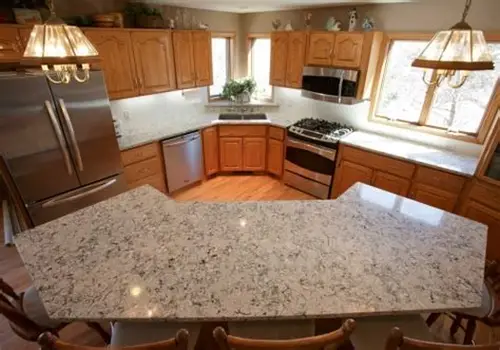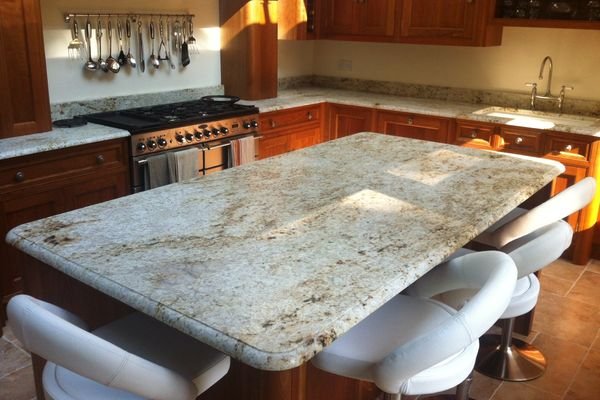Granite, a staple in high-end kitchens and bathrooms, is beloved for its strength, elegance, and earthy appeal. However, many homeowners and designers often ask: does granite stain? In this guide, we explore the porosity, care, and maintenance of granite stone, whether it’s susceptible to stains, and what you can do to protect your investment.

Understanding Granite: A Natural Masterpiece
Granite Geology and Composition
Granite is an igneous rock formed deep beneath the Earth’s crust through the slow crystallization of magma. It’s composed mainly of quartz, feldspar, and mica, which give granite its distinctive grainy appearance and color variations. The mineral composition affects everything from texture to porosity, ultimately influencing stain resistance.
Characteristics of Granite
Granite stone is dense, hard (ranking 6–7 on the Mohs hardness scale—see what is the hardness of granite?), heat-resistant, and relatively low-maintenance. These features make it an excellent material for countertops, flooring, and other heavy-use surfaces.
Is Granite Porous?
Yes, but only to a degree. Granite has small capillaries between minerals that allow liquids to seep in if left unsealed. Learn more about this in is granite porous?

So, Does Granite Stain?
How Granite Reacts to Spills
Granite is far less porous than marble or limestone, but it can still absorb certain liquids—especially oil, wine, and coffee—if left unattended. The porosity varies by color and pattern. For example, white granite countertops are more porous than black granite countertops and thus more likely to stain if not sealed.
Common Stain Culprits
- Red wine
- Oil
- Tomato sauce
- Coffee
- Cosmetics (in bathrooms)
How to Remove Stains from Granite
Using a baking soda poultice or a specialized granite cleaner can help lift most stains.
Pro Tip: Regular cleaning with mild dish soap and water is sufficient for everyday maintenance. Avoid acidic or abrasive cleaners.
Prevention Is Key
- Seal granite annually
- Wipe up spills immediately
- Use trivets, cutting boards, and coasters
- Avoid acidic and oily substances
Sealing Granite: The First Line of Defense
Why Seal Granite?
Sealing granite is essential to reduce porosity and prevent stains. A good sealer fills the natural pores in the stone, acting as a protective barrier.
How Often Should You Seal?
This depends on the granite’s porosity and usage. A simple water test can help determine if resealing is necessary.
Clean Granite Countertops Before Sealing
Ensure the surface is thoroughly cleaned and dry before applying a granite sealer.
Natural vs. Engineered Granite: Stain Resistance Compared
Engineered Granite
Manufactured using granite dust and resins, engineered granite is less porous and more consistent in color and pattern. It’s more resistant to staining but lacks the unique natural appeal.
Natural Granite
Each slab is one-of-a-kind, with its own veining and coloration. While slightly more porous, natural granite offers unmatched beauty and durability when properly sealed and maintained.
Granite Countertop Maintenance Tips
Clean Regularly
Use a soft cloth and a pH-neutral cleaner to clean granite countertops. Avoid harsh chemicals like bleach or ammonia.
Sealing Granite
Sealing frequency depends on granite type and usage. Darker varieties may only need sealing every 2–3 years, while lighter ones might require annual treatment.
Repairing Chips in Granite
Granite is durable, but edges can chip. Repair kits are available, or you can hire a stone fabricator to restore the surface.
Polishing Granite Surfaces
Granite polishing helps restore the shine and keep the surface smooth. It’s usually done during professional maintenance or sealing.
Design Considerations with Granite
Pairing Granite with Cabinet Colors
The pairing of granite with cabinet colors dramatically affects the room’s vibe. See What Color Backsplash Goes with Black and Brown Granite Countertops? and here for backsplash inspiration.
Granite Backsplash Designs
A matching granite backsplash offers visual continuity, while a contrasting material can create dimension and interest.
Cost & Where to Buy Granite Countertops
Granite Countertop Cost
Prices range from $40 to $200 per square foot installed, depending on the rarity, color, and origin of the slab.
Affordable Granite Countertop Options
- Prefabricated slabs
- Lesser-known varieties
- Thinner cuts (2 cm vs. 3 cm)
Where to Buy Granite Countertops
Options include:
- Local stone fabricators
- Wholesale granite suppliers
- Online distributors
Why Choose Aardwolf Granite?
Aardwolf Granite Countertop Collection
Aardwolf offers a curated selection of premium granite slabs known for their durability and aesthetic value.
Aardwolf Granite Installation Services
With professional stone fabricator services, your granite is cut, transported, and installed with precision.
Aardwolf Granite Pricing Guide
Aardwolf delivers competitive pricing and transparent cost breakdowns to help homeowners plan their remodels.
Best Aardwolf Granite Colors
From white granite countertop options to exotic shades, Aardwolf’s catalog offers something for every design style.
Final Thoughts: Can Granite Stain?
Yes, granite can stain, but it’s relatively rare—especially with proper maintenance. As long as you seal it regularly, clean spills promptly, and avoid harsh chemicals, your granite countertops will maintain their beauty and functionality for decades.
Whether you’re deciding between granite vs marble, granite vs quartz countertops, or even granite vs soapstone durability, granite remains one of the best choices for longevity, value, and timeless appeal.
Explore more helpful resources:

